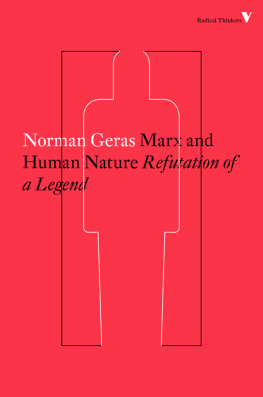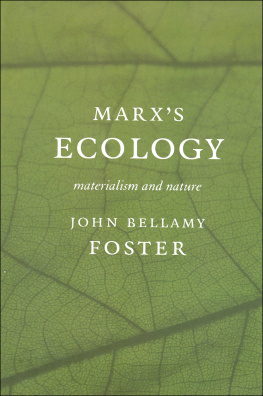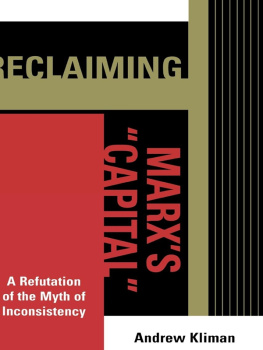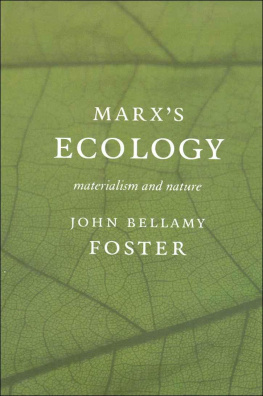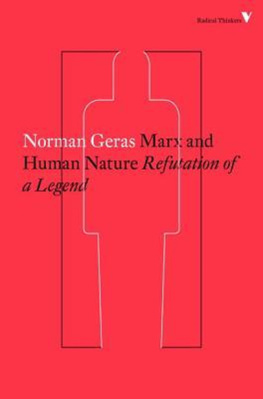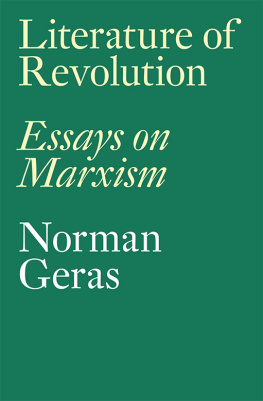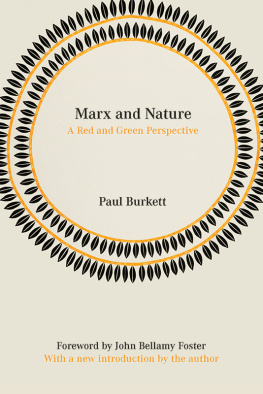Geras - Marx and human nature - refutation of a legend
Here you can read online Geras - Marx and human nature - refutation of a legend full text of the book (entire story) in english for free. Download pdf and epub, get meaning, cover and reviews about this ebook. City: Verso Books, year: 2016, publisher: Penguin Random House LLC (Publisher Services), genre: Science. Description of the work, (preface) as well as reviews are available. Best literature library LitArk.com created for fans of good reading and offers a wide selection of genres:
Romance novel
Science fiction
Adventure
Detective
Science
History
Home and family
Prose
Art
Politics
Computer
Non-fiction
Religion
Business
Children
Humor
Choose a favorite category and find really read worthwhile books. Enjoy immersion in the world of imagination, feel the emotions of the characters or learn something new for yourself, make an fascinating discovery.
Marx and human nature - refutation of a legend: summary, description and annotation
We offer to read an annotation, description, summary or preface (depends on what the author of the book "Marx and human nature - refutation of a legend" wrote himself). If you haven't found the necessary information about the book — write in the comments, we will try to find it.
Geras: author's other books
Who wrote Marx and human nature - refutation of a legend? Find out the surname, the name of the author of the book and a list of all author's works by series.
Marx and human nature - refutation of a legend — read online for free the complete book (whole text) full work
Below is the text of the book, divided by pages. System saving the place of the last page read, allows you to conveniently read the book "Marx and human nature - refutation of a legend" online for free, without having to search again every time where you left off. Put a bookmark, and you can go to the page where you finished reading at any time.
Font size:
Interval:
Bookmark:



NORMAN GERAS

This edition published by Verso 2016
First published by Verso 1983
Norman Geras 1983, 1994, 2016
All rights reserved
The moral rights of the author have been asserted
3 5 7 9 10 8 6 4
Verso
UK: 6 Meard Street, London W1V 3HR
US: 20 Jay Street, Brooklyn, NY 11201
versobooks.com
Verso is the imprint of New Left Books
ISBN-13: 978-1-78478-235-1 (PB)
eISBN-13: 978-1-78478-237-5 (US)
eISBN-13: 978-1-78478-236-8 (UK)
British Library Cataloguing in Publication Data
A catalogue record for this book is available from the British Library
Library of Congress Cataloging-in-Publication Data
A catalog record for this book is available from the Library of Congress
Typeset in Bembo
TO ADLE
as is well known, a spark
dazzles rather than
illuminates: nothing is
more difficult to locate in the
darkness of the night than
the point of light which
breaks it.
-Louis Althusser
This short essay attempts to dispose once and for all of a rather obstinate old legend about the thought of Karl Marx. So far at least as these things do depend upon the marshalling of sound evidence and argument, that aim is not excessively ambitious. For the legend is certainly false. I hope to have provided here both evidence and argument enough to demonstrate its falsehood. In any case, it is the hope of a conclusive refutation that accounts for features of the essay of which it would be as well to inform the reader in advance. Some brief remarks on how it was originally conceived will serve this purpose.
You will not go very far in discussion either within or about Marxism before encountering the view that one of the things bequeathed to this intellectual tradition by its founder was a denial of the idea of a universal human nature. That view, which had already had a good life when Althussers theoretical anti-humanism imparted to it a new confidence and vigour, has long struck me as being pretty remarkable, and it was my attendance at a certain seminar one evening in early 1979 that led me to want to confront it. The seminar, in fact, was not about Marx or about Marxism. It was on the subject of human needs. I no longer recall the details of the discussion, only that the theoretical and practical viability of a concept of common human needs was received with general scepticism, and this was sustained in part - or so it appeared to me - by impulses of a relativist and idealist kind. Since much of both philosophy and social science is thick with relativist and idealist themes, there is perhaps no great cause for puzzlement here. Nevertheless, the occasion did crystallize in my mind the thought of how surprising it was that Marxists also, would-be materialists amongst them, should often sponsor more or less similar themes in support of a similar scepticism; how very extraordinary indeed, in view of what I had read in Marx, in view equally of some obvious facts about the world, that the claim that he rejected the idea of human nature should be so widely made and believed.
I decided to look and see just what from Marxs work is generally given as confirmation of the claim. The answer is: not very much - actually only a single passage that can be said to amount to anything, though Marx himself did not think fit to publish the text containing it; and, apart from that, a few other odds and ends which, considered for the role of evidence in this matter, amount to nothing at all. The one item of any plausibility is some lines from the Theses on Feuerbach and it is with a close and extended analysis of those lines that I have chosen therefore to begin the present study. Some may perhaps find this analysis rather too extended and wonder why, when so much in Marxs writings can be brought against the claim in question, I was not content simply to appeal to that and to see off the passage from the Theses with more dispatch. I would ask only that they postpone judgment of the opening analysis until they have digested what follows it. I hope the sequel will persuade them of its point.
Here it will suffice to say this much. There are already plenty of commentaries on Marx which draw attention to this contrary evidence. Nothing was to be gained by just repeating them. However, by focusing initially on the best of the textual support for the disputed claim, we first square up to the latter on its own chosen terrain, so to speak, meet it at what may be supposed to be its strong point. From doing this, as it happens, there is something to be gained. It may be a few lines only that become thereby an object of detailed attention, but they have been made to bear a heavy weight in the exegesis of Marx. Relying on their support, the legend that he dispensed with the concept of an intrinsic human nature manages to survive in the face of textual evidence that he did not: either this is simply ignored or else, if its existence is conceded, it is treated as the basis merely of one reading of Marx to which however another, alternative reading can be opposed, or else it is said not to represent the real, or the most profound, tendency of his mature thought; and so on. Yet, examination of the relevant lines from the Theses on Feuerbach reveals that their sense is not, in fact, transparent. They can be understood in a number of ways. And when the various possible meanings of this passage are placed within the only possible context for its proper assessment, the interpretation of Marx that has been so reliant on it is shown not to be a viable one at all. It is left without even the slenderest title to philological respectability.
A second feature of my approach here of which notice should be given is that I take this interpretation at its word. The argument that Marx rejected all concepts of a universal human nature is construed in its literal sense. For, its advocates do themselves emphasize that what he opposed was not just this or that view about human nature but the very idea of one, and it is only this emphasis, moreover, that justifies presentation of the argument as though it were a theoretically bold and momentous one and told us something distinctive about him. Such it would scarcely either be or do if the proposition was merely that Marx dismissed some conceptions of human nature. Of whom is that not true? I am aware, all the same, that construing this particular argument in a straightforward way lends an air of strangeness, a certain unreality, to parts of the discussion, and this might prompt the suggestion that it would be intellectually more charitable therefore, and the claim more credible, if one took a narrower view than I do here of what counts as a concept of human nature. Now, of course, should we choose to include under this heading just those conceptions of an enduring and common human make-up with which Marx did in fact disagree, but not any that he, for his part, entertained, then the claim will appear very credible indeed. However, I can think of no genuinely compelling reason for doing this. Intellectually charitable it certainly is, but it gives us a definition that is eccentric and, worse, tendentious: selected with the claim in mind; purposely designed for the rescue of a bad, albeit widely used, argument. The view taken in this essay of what is to count as a concept of human nature is, on the contrary, a quite standard one. It is one that is found, as we shall see, in Marxs own usage. Most importantly, it is the one embodied in what the claims advocates actually say, for all that this renders their claim unreasonable. It is better to be true to what they say than to be charitable to it. And it is more than time. This is a case like that of
Font size:
Interval:
Bookmark:
Similar books «Marx and human nature - refutation of a legend»
Look at similar books to Marx and human nature - refutation of a legend. We have selected literature similar in name and meaning in the hope of providing readers with more options to find new, interesting, not yet read works.
Discussion, reviews of the book Marx and human nature - refutation of a legend and just readers' own opinions. Leave your comments, write what you think about the work, its meaning or the main characters. Specify what exactly you liked and what you didn't like, and why you think so.

